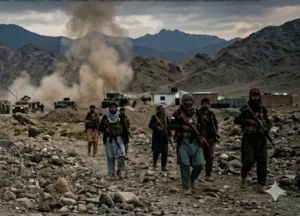Syria witnessed a historic moment as rebel forces overthrew President Bashar al-Assad’s regime after 13 years of civil war. Rebels stormed Damascus. The rebels declared the capital as liberated, which further forced Assad to flee to Moscow. The fall of Assad’s regime marked the end of five decades of authoritative rule.
The Military Operations Command, a coalition of Islamist and moderate factions, led the attack. The group led by Abu Mohammad al-Jolani, the head of the militant group Hayat Tahrir al-Sham (HTS), advanced through Syria in just 11 days.
Beginning with Aleppo, rebels seized key cities, including Hama and Homs, before circling Damascus. Despite Russian and Syrian airstrikes, the opposition’s swift march faced minimal resistance. Abu Mohammad al-Jolani emerged as a prominent figure during the attack.
When Damascus fell, videos showed rebel fighters entering the presidential palace. They uncovered Assad’s luxurious lifestyle, including an expensive car collection. Prisoners were freed form notorious detention centers long known for torture and inhumane conditions.
President Assad and his family reportedly fled to Moscow, where Russia granted them asylum. Assad’s departure ends decades of brutal rule marred by documented atrocities, including mass incarceration, torture, and killings. His government’s use of chemical weapons in 2013 during the Ghouta attack and systematic repression of dissent left a legacy of fear and devastation.
Jolani announced plans for a government based on elected representation and pledged to protect all religious sects. However, concerns persist over HTS’s extremist past and its designation as a terrorist organization by Western nations.
Assad’s downfall can be attributed to the weakened support from his key allies. Russia’s ongoing war in Ukraine and Iran’s escalating conflict with Israel drained resources and left a power vacuum in Syria. Rebels exploited the situation and launched a surprise attack.
US President Joe Biden called the event a historic opportunity for Syria to rebuild but warned of potential instability. Iran’s ambassador to Syria, Hossein Akbari, cautioned the fallout could trigger wider regional conflicts involving turkey and other regions,
Syria’s future remains uncertain as the country transitions from decades of autocracy to a fragile new order. While many Syrians celebrate the fall of Assad’s regime, questions linger about how the rebel factions will govern.









